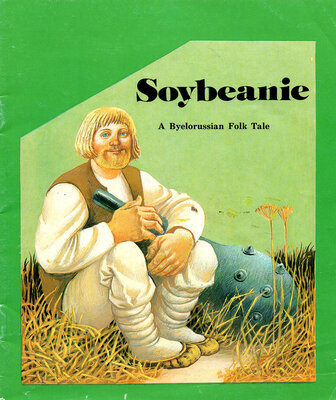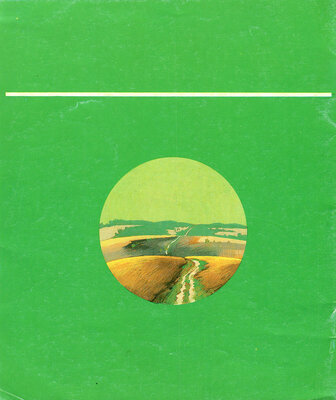Soybeanie
A Byelorussian Folk Tale
Translated into English by M. MINTZ
Illustrated by V. VOLYNETZ
Minsk Yunatstva 1989
Once upon a time there lived a man and his wife. They had two sons and one daughter.
Such hard-working boys as these hardly anybody had ever seen. They never sat about idle, and if there was nothing for them to do at home, they would go to earn their living by working on land belonging to other people.
Their sister was even a more wonderful person. It was difficult to find another girl to equal her in beauty or in sweetness. And her name was Yasanya.
Once, in summer, having finished all their work at home, the brothers decided to go in search of work among strangers.
“If we don’t return within three days,” the brothers said, “then let Yasanya bring us something to eat.”
“But, my dear brothers, how shall I find you? Where shall I bring you something to eat?” Yasanya asked her brothers when they were already in the yard.
“We’ll scatter straw on the road as we go. You’ll follow where this straw leads to, and you’ll find us.”
They took leave of their parents and their sister.
© Ілюстрацыі. Выдавецтва «Юнацтва», 1987.
© Translation into English, Yunatstva Publishers, 1989.
As they walked the brothers scattered straw on the road and they said:
“Our Yasanya will come walking here and she will not lose her way.”
But in these parts there lived a terrible serpent. His tongue was made of iron, his eyes were like millstones and they burned like fire. He lived in a castle that was built of the bones of human-beings.
The serpent overheard what the brothers had said and he learned what the straw was for. He gathered th_s straw and scattered it along the road that led to his bone castle.
“She will follow this path that I have covered with straw and she will come to my castle,” the serpent said to himself.
And that is exactly what did happen.
One day passed, another day passed — the bro
thers did not appear.
On the fourth day Yasanya got ready to leave. She took bread and food and left.
She walked on and on along the road that was covered with straw. And the road led her deeper and deeper into the forest. It was dark and still in the forest, the sky could hardly be seen there. Yasanya kept on walking and she was beginning to feel frightened.
“Where then are my brothers? Why have they gone so far?” thought the girl. It was already evening when she came up to the bone castle that belonged to the evil serpent.
As Yasanya took a look at it, she became horrified. Her heart almost stopped beating: human bones were lying scattered about everywhere.
What should she do? She began running back to where she had come from. She ran on and on. Suddenly she heard something rustling nearby. She turned
round — a serpent was catching up with her!
The serpent grabbed her and carried her into the castle.
“I’ve been waiting for you,” the serpent said. “Now you will live with me — you will be my wife.”
Yasanya wept, she begged and begged the serpent to let her go, but to no avail.
Her brothers waited for her to come on the fourth day. They waited and waited, but they waited in vain. They went back home.
“Why didn’t you send us anything to eat?” they asked their father.
The father became frightened:
“What do you mean I didn’t send you anything to eat? Didn’t Yasanya then come to you?”
And the brothers became frightened.
“I’ll go and look for her,” the eldest brother said.
He made ready and left. He walked and walked along the road covered with straw, but he did not notice that it was not the road that he and his brother had followed, and he came to the castle made of human bones.
He met his sister.
“Where, dear brother, have you come to? Don’t you know where you have come to? Yasanya asked him. “A terrible serpent lives here. He will eat you up. Run away from here as quickly as you can.”
“If I run away it will be together with you,” her brother said to her.
“No, dear brother, he can scent my skin — he will catch up with us and take you prisoner. But if you run alone perhaps you’ll be able to escape.”
Hardly had she uttered these words, than she heard an alarming sound, a sound so loud that it even deafened them. They turned around — it was the serpent flying towards them.
“This is my brother who has come to us,” Yasanya said to the serpent.
“That’s good,” said the serpent. “Then lead him into my house, he will be my guest.”
When they were in the castle, the serpent said to Yasanya:
“Give us some iron beans to taste.”
Yasanya brought the iron beans. As the serpent began to eat those iron beans, sparks began to fly about, while the poor fellow, Yasanya’s brother, having taken one bean, almost broke his teeth on it. He chewed and then spat the bean out of his mouth.
And how the serpent began to yell at him!
“What do you mean by scorning my food? I can eat it and you cannot? In what respect are you any better than I am?”
The poor guest sitting there was afraid to make a move.
“Come and I’ll show you my riches!”
The serpent led his guest out into the yard and hanged him on a gate, and then he returned to Yasanya and said:
“I have just hanged your brother because he did not wish to eat my beans.”
Yasanya began to weep bitter tears, however that did not help her or her brother.
In a day or two Yasanya went out onto the road and there she saw her other brother coming in search of her.
The very same fate awaited her second brother.
The man and his wife waited for their sons and their daughter one day, then another. They waited a week, but their sons and daughter did not come.
Once, at dawn, the wife went to fetch water. She noticed a soy-bean rolling along the road. She picked it up, examined it, and ate it up. And something exceptional began to develop from it. She felt the soy-bean beginning to grow within her body. And
within two weeks’ time she gave birth to a son. And so big was he and so wonderful that it was simply amazing. And the very moment that he was born, he began to yell:
“Mama! Give me something to eat!”
His voice was so terribly rough that it frightened everybody who heard it. This fellow grew not by the day but by the hour, and within a month he had grown so big, with a beard into the bargain, that even his father was afraid of him.
Long did they think what name to give him, and finally they called him Soybeanie.
After some time had passed Soybeanie said to his
father:
“Here, Father, take this pin to the blacksmith and tell him to forge a mace from it weighing 250 pounds.”
His father thought: “What a foolish fellow! He wants to have a mace made from a pin and the mace should weigh 250 pounds.” But the father was afraid to say this to his son. He rode off to the city, bought 250 pounds of iron and took it to the blacksmith’s.
“Make a mace,” he said “that will weigh 250 pounds.”
The blacksmith forged and forged and finally forged the mace. It was dragged onto a cart and the father brought it home.
“Here, son,” he said, “here is the mace for you.” They rolled it down onto the ground.
Soybeanie picked up the mace with one hand and thrust it upward so high that it reached the sky.
Having thrust that heavy thing up into the sky, he went back into the house, had something to eat, talked yet a while with his parents, and then he said:
“Well, Father, let’s go out into the yard.’’
They left the house and went to the field.
Soybeanie looked up into the sky. “Look, Father! The mace is flying back here!”
No sooner had his father looked, than he heard the mace hooting in the air.
Soybeanie raised his knee. How the mace struck against it! BANG! And the mace broke in half against his knee! Soybeanie shook his head.
“Confess, Father, that you did not have the mace forged from that pin!”
His father drove off to the city again, bought 250 pounds of iron and again brought it to the blacksmith’s. The blacksmith forged a new mace. The father brought it home.
Soybeanie thrust it high upward, raised his knee under it — the mace only got bent somewhat.
“Well, this mace is a good one. Now then, Father, I can go in search of my sister.”
Soybeanie did not think long before he took the mace and set off for the serpent’s castle.
The serpent felt some great danger threatening him. He rushed out and came face to face with Soybeanie on the road. They looked one another over as if they were afraid of each other, and they kept silent. And not far away there stood Yasanya. Soybeanie guessed that it was his sister standing there.
Finally the serpent said to Soybeanie:
“Come, let’s go in, brother, and we’ll taste some beans.” They entered the castle, sat down at little iron tables.
As soon as Soybeanie sat down at his table, the table broke into pieces. The serpent was surprised and frightened. He gave his guest another table, a stronger one. But this one bent under Soybeanie. They began to eat the iron beans. They ate until they had eaten up everything.
The serpent even turned red, so terrible was the feeling that here was a man who was stronger than himself.,He twisted and he twirled and then he said:
“Let’s go, brother, and have a look at my riches.”
They went to the threshing-place. This threshingplace was a very large one. You could not even see from one wall to another. The threshing-floor was covered with copper. Iron columns supported the roof. And two bodies were hanging on these columns, bodies of persons already long dead.
Whose are these bodies then that you have hanging here?” Soybeanie wanted to know.
“They are my wife’s brothers.”
Soybeanie, overcome with fury and hatred, began to tremble.
“Oh! You vile thing! So it’s you who hanged my brothers!” Soybeanie roared. And he grabbed the serpent with his bare hands, and he choked him and gave him such a blow that the serpent landed on the copper threshing-floor. Then Soybeanie took his mace and hit the serpent so hard on his nose that the blood began to flow.
And Soybeanie struck again, this time on the head. And that was the end of the serpent.
Soybeanie returned home leading his sister there.
SOYBEANIE
A Byelorussian Folk Tale Translated into English by M. MINTZ Illustrated by V. VOLYNETZ Minsk. Yunatstva Publishers, 1989 Printed in the USSR
ISBN 5-7880-0308-3
 КНІГІ ОНЛАЙН
КНІГІ ОНЛАЙН

